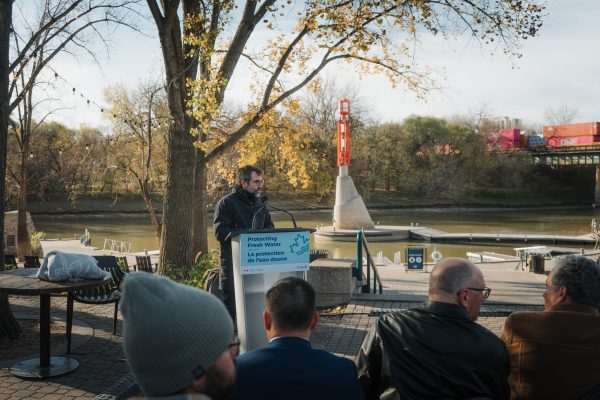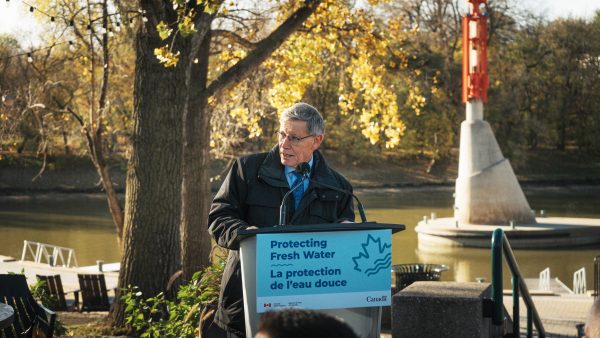The federal government launched the Canada Water Agency at the Forks Historic Port — situated at the junction of the Red and Assiniboine Rivers — on Oct. 16. The agency’s mandate is to improve freshwater management across the country.
“Freshwater has been facing challenges,” said Steven Guilbeault, the federal minister of environment and climate change. “Challenges that are intensifying due in large part to climate change. Droughts, floods, deteriorating water quality, pollution from farming and industrial activities have significant impacts on water quality. Impacts that are very serious and costly.”
Guilbeault explained that the agency will help the federal government address current and future water challenges. “We need to be better prepared for what comes into the future. We need to recognize that water is becoming more scarce and more precious. We have a responsibility to protect the waters we have.”
In 2019, the federal government introduced the Canada Water Agency as a platform commitment to keep the nation’s water safe and ensure it is well-managed. In Budget 2023, $85.1 million was allocated over five years for the creation of the agency, a branch within Environment and Climate Change Canada, with $21 million ongoing thereafter. Legislation was introduced as part of Bill C-59 to create the standalone Canada Water Agency, which came into force on Oct. 15.

Steven Guilbeault, the federal minister of environment and climate change speaking at the launch of the Canada Water Agency.
Terry Duguid, parliamentary secretary to the prime minister and special advisor for water, said that the agency “will have significant independent decision-making power to be that advocate for freshwater from coast to coast to coast.”
“Tackling today’s freshwater challenges will require strong collaboration among governments, Indigenous partners, non-government organizations, academia, industry and others,” said Duguid. “The Canada Water Agency will provide the leadership to foster the partnerships that we need to protect fresh water.”
Duguid stated, “the guidance of First Nations, Métis and Inuit people has been instrumental in shaping the establishment of the Canada Water Agency, and we look forward to continuing our partnership.”
The agency’s current initiatives include leading the Freshwater Ecosystem Initiatives in eight waterbodies: Lake Winnipeg, the Great Lakes, Lake of the Woods, Lake Simcoe, the St. Lawrence, Saint John, Fraser and Mackenzie Rivers. The goals include restoring and protecting the water quality and aquatic ecosystem health, as well as advancing monitoring capabilities.
Other initiatives of the agency entail the modernization of the Canada Water Act — federal legislation proclaimed in 1970 which provides legal framework relating to the treatment of water resources. The agency will also develop a national freshwater data strategy while supporting freshwater science.
As of this year, the Canada Water Agency has committed to providing over $90 million to 175 different projects across the nation to improve freshwater management.
Daniel Wolfish is serving as the agency’s interim president.
The agency’s headquarters is located in Winnipeg at 510-234 Donald Street. “The agency right now is about 215 employees. A hundred will be located in downtown Winnipeg,” said Duguid. Five regional offices will also be situated across Canada.

Terry Duguid, parliamentary secretary to the prime minister and special advisor for water speaking at the launch of the Canada Water Agency.
“It will bring more sustainable jobs to our city, boosting our economy [and] building on the innovation already happening,” said Mayor Scott Gillingham.
“It’s a huge vote of confidence for our city and province’s expertise, resilience and leadership when it comes to managing one of the most precious resources that we have.”
When asked whether the agency will collaborate with the U of M, Duguid clarified that it is a “definite yes.” Duguid added, “we have incredible water expertise at the University of Manitoba.” He stated that scientists on campus will be working closely as part of the collaboration. Wolfish indicated that student involvement has also transpired through internships.
Mario Pinto, the university’s vice-president (research and international), stated that “we have been working for the past year to convene the researchers working on all aspects of water across the faculties of the university as well as the Experimental Lakes Area scientists, working toward formation of a senate-approved institute.”
Pinto indicated that the institute would embrace all disciplines, and once approved as an institute, the researchers would collaborate with those at the Canada Water Agency to positively impact water security — one of the themes of the university’s Strategic Research Plan 2024-29.
“We have come to ground on a strategy that incorporates Indigenous perspectives and concepts, starting with the concept of water as the giver of life,” stated Pinto.
Duguid mentioned that significant progress has been made in the management of our freshwater bodies, but added that there is still much to do. “Together, with all of you, we will protect and restore Canada’s freshwater for generations to come.”


